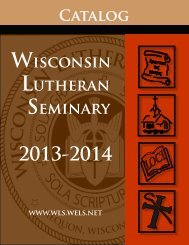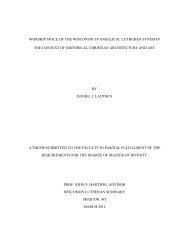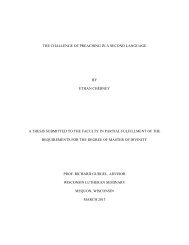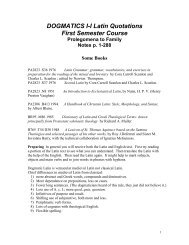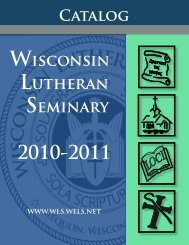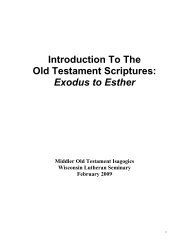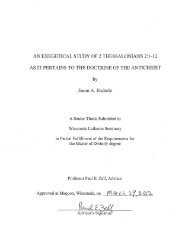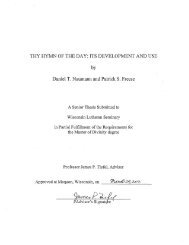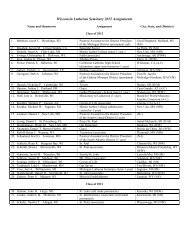Untitled - Wisconsin Lutheran Seminary - WELS
Untitled - Wisconsin Lutheran Seminary - WELS
Untitled - Wisconsin Lutheran Seminary - WELS
Create successful ePaper yourself
Turn your PDF publications into a flip-book with our unique Google optimized e-Paper software.
word that goes out from my mouth: It will not return to me empty, but will accomplish what I<br />
desire and achieve the purpose for which I sent it” (55:11). This powerful word is not only that<br />
which God speaks but that which God has written and recorded in Scripture through divine<br />
inspiration.<br />
The source of this breath is not in question; however, there is a textual variant in the<br />
verse. The pronoun αὐτοῦ refers back to ὁ κύριος [Ἰησοῦς]. The inclusion of Ἰησοῦς is a textual<br />
variant. Evidence supports this word’s omission and inclusion. Both readings have early<br />
manuscript evidence. 78 Perhaps the simpler translation is preferred. The simpler translation<br />
would omit Ἰησοῦς from the sentence. Yet whether it is included or omitted, the meaning of<br />
Paul’s words remain the same. Undoubtedly by ὁ κύριος Paul was referring to Jesus. Ernest Best<br />
summarizes as follows: “Though ‘Jesus’ is widely and anciently attested it is not clear if it is the<br />
true reading: the whole phrase, ‘the Lord Jesus’, appears so often in this letter that scribes could<br />
easily have added ‘Jesus’ to ‘the Lord’; in any case ‘the Lord’ is certainly Jesus.” 79 Further<br />
support comes with the same personal pronoun αὐτοῦ used in connection with the noun τῆς<br />
παρουσίας (“the coming”) in the following phrase. This section of the letter as introduced in<br />
verse one is “concerning the coming of our Lord Jesus Christ” (ὑπὲρ τῆς παρουσίας τοῦ κυρίου<br />
ἡμῶν Ἰησοῦ Χριστοῦ), so the inclusion or exclusion of the name Jesus here does not cause any<br />
textual problems.<br />
By the appearance of the Lord’s coming<br />
As if the picture presented with the verb ἀνελεῖ was not enough, Paul uses another<br />
finalizing word καταργήσει to describe what will happen to the Antichrist. καταργήσει is from<br />
καταργέομαι and means “to cause something to come to an end or to be no longer in existence, to<br />
abolish, to wipe out.” Lenski suggests that because Paul uses two different verbs that have two<br />
different datives of means attached to them, this must be two different acts. He says, “While the<br />
Word blasts the lawless one, ‘the epiphany of the Parousia,’ the actual appearance of the Lord<br />
78 Some early manuscripts have just “the Lord” (B, D 2 , K, Textus Receptus). Some early manuscripts<br />
include “Jesus” (a, A, D, G, P, Ψ).<br />
79 Ernest Best, A Commentary on the First and Second Epistles to the Thessalonians (Peabody, MA:<br />
Hendrickson Publishers, 1988), 303.<br />
40



